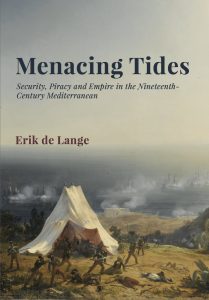Our present predicament of omnipresent uncertainty, sudden twists of fate and the sense that a serious menace looms somewhere beyond our reach make it all the more understandable what seafaring people and coastal communities fear most about piracy – both in the present and the past. Like a foreign disease that washes upon the beach, piracy has been such a threatening aspect of life at sea because it appears out of nowhere, unchecked by rules on violence or raiding. A ship appears on the horizon, seemingly friendly at first, but then flags change and a chase on the vast expanses of the high seas begins. In the nineteenth century, piracy on the Mediterranean Sea was, in fact, even considered by some to be a type of plague that had to be fought with unprecedented security measures. As such, the historical repression of piracy touches upon enduringly relevant topics of security, violence, law and the dynamics of international inclusion and exclusion. My dissertation on the nineteenth-century fight against Mediterranean piracy, which I recently defended at Utrecht University, uncovers the dynamics of security during a pivotal moment in history and shows how piracy repression helped remake the Mediterranean into a space of European imperial expansion.
The nineteenth century, and especially its first half, was such a critical moment for the repression of piracy on Mediterranean waters because it was a time of sudden and profound changes. When the Revolutionary and Napoleonic Wars ended, and a general peace amongst the powers of Europe came into place with the Congress of Vienna of 1814-1815, new ideas on warfare and violence at sea began to take shape. Resultantly, the so-called Barbary corsairs hailing from the North African Ottoman vassal states of Algiers, Tunis and Tripoli, who engaged in sanctioned privateering wars against European enemies, came to be seen in Europe as illegitimate outlaws. After 1815, a collective of historical actors that ranged from scholars and retired admirals to senior diplomats and captains’ wives succeeded for the first time to portray these North African raiders as a shared threat to European security.

At the same time, the multilateral meetings and cooperative mechanism of the international system that arose in Europe allowed this perceived threat to be fought collectively, through common practices of security. Within the ERC project in which I carried out my research we understood these cooperative frameworks as a ‘security culture’, based on shared notions of threats and the means to confront them. North African privateering, recast as ‘Barbary piracy’ would be one of the prime concerns of the emergent nineteenth-century European ‘security culture’, alongside other threats such as revolutionary fervor, imperial warmongering and the slave trade.
In the Mediterranean, the international engagement with the perceived threat of ‘Barbary piracy’ brought naval violence, diplomatic intimidations and a complete political overhaul of the region. From the Anglo-Dutch bombardment of Algiers in 1816, the first implemented security effort, to a series of ambassadorial conferences in London and a Franco-British diplomatic mission to North Africa in 1819, discourses of security and ‘European’ interests permeated the repression of piracy. Though the North African practice of raiding endured in the face of this mounting repression, the French government in 1830 successfully used claims of bringing a definitive end to the ‘plague’ of piracy to legitimize and garner international support for its invasion of Algiers, which marked the start of a long and troubled process of colonization in Algeria. The fight against piracy thus spurred on European imperial expansion, did away with old modes of maritime warfare and hence worked to remake the Mediterranean as a space of security, marked by asymmetries of power. From our present vantage point of an uncertain predicament, we can see how the engagement with perceived threats to security can foster impactful political changes, the long legacy of which we still live with today.

Dr. Erik de Lange is affiliated to Utrecht University as a junior lecturer and postdoctoral researcher. He is now doing research on naval cooperation and the international ordering of the Mediterranean Sea in the nineteenth century.
